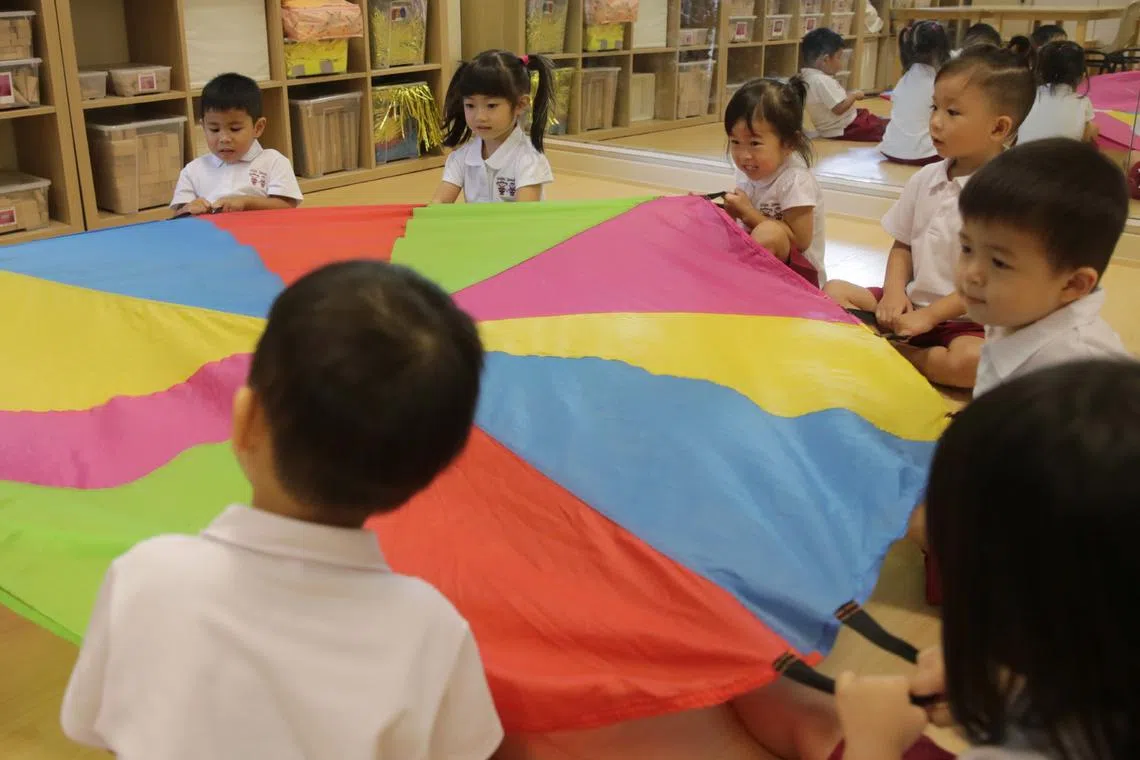Faith-based pre-schools band together, pool resources amid stiff competition for pupils
Sign up now: Get ST's newsletters delivered to your inbox

Children at Little Seeds Preschool (Church of the Good Shepherd) participating in a Chinese music and movement class.
ST PHOTO: GIN TAY
Follow topic:
SINGAPORE - Several Christian denominations have banded their pre-schools together under newly formed companies in a bid to keep them running amid stiffer competition for pupils.
In this way, the pre-schools can reap the benefits of centralised operations and economies of scale in terms of resources, said representatives from the various groups.
The Straits Times had reported in 2018 that several faith-based kindergartens affiliated with churches were closing down due to challenges relating to finances, dwindling enrolment, teacher recruitment and changing family needs.
Since then, efforts by various operators to consolidate resources have stemmed the decline of such pre-schools, with a good number of kindergartens expanding their services to provide full-day childcare.
More than 50 faith-based pre-schools have also joined an inter-denominational Christian Preschool Alliance, formed in 2019 for centres to pool resources and share best practices.
Anglican Preschool Services (APS) now manages 19 pre-schools, 14 of which offer childcare, mostly under the Little Seeds brand that was set up in 2019. The operator has nearly 2,500 children enrolled across the centres.
APS chief executive Andrew Tay said eight non-Anglican pre-schools, many of which were on the brink of closure, first joined the organisation four to five years ago.
It receives government funding, with partner operator status for 10 Little Seeds centres, which means that parents with children at these pre-schools pay lower fees.
“We wanted to continue to offer childcare services to the masses. We needed to be competitive in pricing, and the only way to do that is to get on the government scheme,” said Mr Tay.
While kindergarten enrolment has been coming down at an “alarming” rate, he said childcare enrolment has been steadily climbing, adding: “Our plan is to pivot most, if not all, of the centres to childcare because it is quite impossible to keep running kindergartens in this space with increasing competition.”
About four years ago, APS started to experiment with having extended hours for older children at some of its kindergartens to cater to parents’ needs.
“We face a lot of challenges, but we do have a good structure at the headquarters, and a good way of operating pre-schools. We still need to grow a little bit more to hit critical mass,” said Mr Tay.
“We have to find creative ways to continue doing this work, and keep evolving with the times.”
Mr Lim Ee Tuo, executive director of Presbyterian Preschool Services (PPS), which was formed in 2021, said a key challenge is convincing teachers and principals to offer childcare services.
“Many of the kindergartens have been running like this for years, so they are familiar with the kindergarten structure; they like the school holiday arrangement and shorter hours,” he said.
PPS has about 800 children across 11 centres, which are on the partner operator scheme. In 2023, the operator took over the running of three new kindergartens – all within church premises – under a new brand called Little Olive Tree. Two of the centres now offer childcare services.
Mr Lim said the centres now also adopt a centralised curriculum that focuses on areas such as cognitive development, Chinese language, community service, as well as care and support for children with learning needs.
In 2022, PPS started an educational support programme for children with special needs across all its centres, with funding from the Chua Foundation, a philanthropic institution.
“We believe that Christian pre-schools have a unique role to play in the community, so we want to provide that option to parents,” he said.
“Demand only comes when parents see that your service is different from others. Naturally, our centres must carry Christian values and practices.
“But we also need to raise overall quality because parents are not prepared to compromise academic learning for the sake of values and principles.”
The Methodist Church set up Methodist Preschool Services in 2020 to centrally manage pre-schools that were operating on their own under the purview of individual Methodist churches.

Children at Little Seeds Preschool (Church of the Good Shepherd) participating in a Chinese music and movement class.
ST PHOTO: GIN TAY
It currently has about 800 children across six centres, and this will grow to about 1,000 when the seventh centre – Ang Mo Kio Methodist Preschool – joins the group in June.
Mr Roland Tan, executive director of Methodist Preschool Services, said it is evaluating the feasibility of having more centres provide childcare services.
Currently, just one of its six centres – Serangoon Garden Methodist Preschool – offers full-day childcare, while the rest offer a five- or six-hour extended programme, which started in 2021.
Mr Tan said the consolidation brought about cost savings through economies of scale in areas such as marketing, administration and acquiring teaching resources. There is also more communication and collaboration among the centres.
In the past two years, the pre-schools have introduced new curriculum content, along with education technologies with a science, technology, engineering and mathematics focus.
This includes a space-themed programme with hands-on activities and play, and basic coding. A new Music Odyssey programme was started in 2023 at some centres, with plans for expansion to the rest over the next few years.
Separately, nine Catholic pre-schools with about 700 children have come under a new brand, Little Shepherds’ Schoolhouse (LSS), created in 2020. Three of the centres are on the partner operator scheme.
Mrs Shirley Tan, executive director of Catholic Preschool Education (Singapore), which manages the LSS centres, said two of them are kindergartens, and the rest are childcare centres, or in the process of converting to childcare.
The past two years were spent upgrading pre-school facilities and developing a centralised curriculum, she said. “It is tough, but we try our best to create value in terms of the human touch and a unique classroom experience – the relationship between teachers and families,” she added.
“We want to nurture the children from young, so that when they grow up, they have the skills to handle the chaos outside in the world.”
Family physician Clarice Chong, 33, whose 2½-year-old son is in Little Seeds Preschool (Church of The Good Shepherd), said: “We wanted a nurturing environment and something more than custodial care... he enjoys school a lot and usually wants to stay longer.
“The school is also strong in Chinese language... within three months, my son could speak short Chinese sentences with us at home.”
Meanwhile, private operator Charis Montessori has also stepped in to take over two more church kindergartens in the past three years. It now has four pre-schools, all of which are in church compounds, and is exploring partnerships with three more church kindergartens.
Its director, Mr Roland Tan, said it had to raise fees to cover rising costs and teachers’ salaries.
“As parents pay more, they also want more services and updates on their kids’ progress,” he said, pointing out that the operator has introduced a mobile application to communicate with parents.
“Parents are spoilt for choice in the early childhood scene. We have to use social media to reach them, hold talks for them and invite them to the pre-schools for open houses at the weekends.”
He added: “It is not the end of the road for church pre-schools. It is the beginning of a new way of doing things.”


